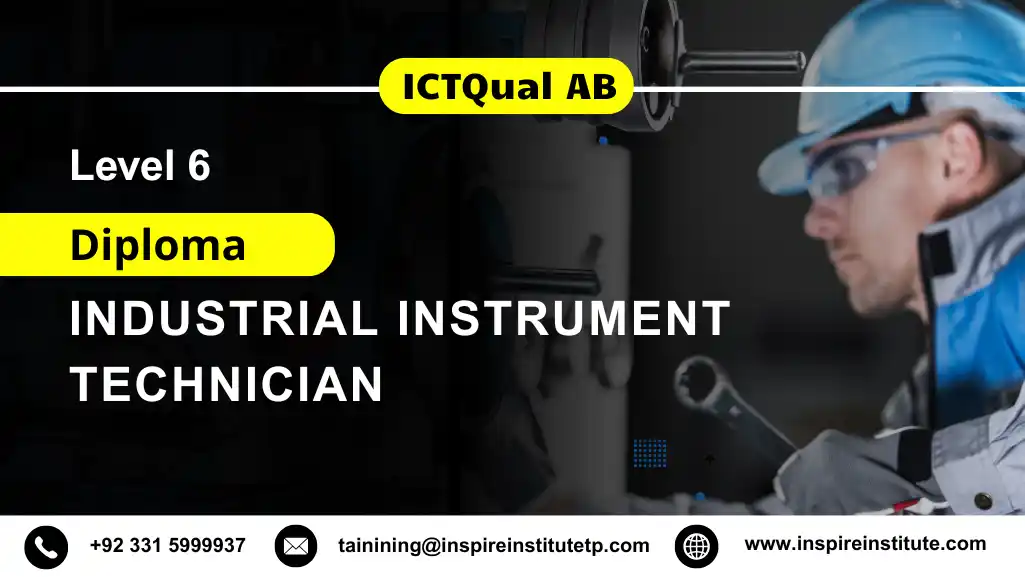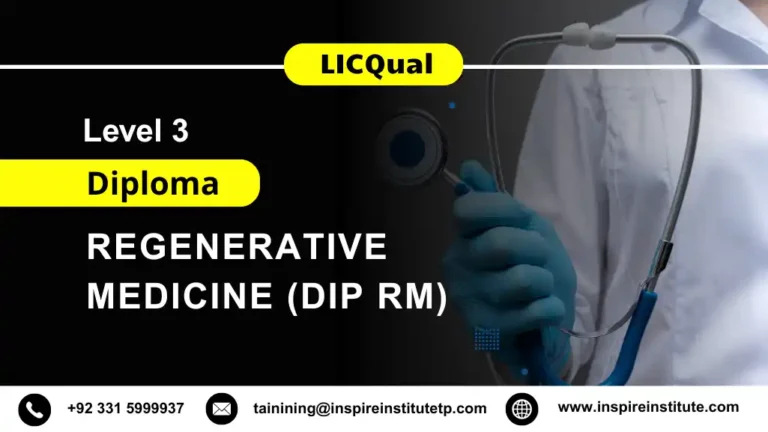ICTQual AB Level 6 Diploma in Industrial Instrument Technician
The ICTQual AB Level 6 Diploma in Industrial Instrument Technician is an advanced qualification designed to meet the growing global demand for skilled professionals in industrial instrumentation and control systems. In today’s era of automation, process optimization, and industrial digitalization, the need for qualified instrumentation technicians has become critical. This course provides Industrial Instrument an in-depth understanding of modern instrumentation technologies, advanced control systems, and industrial process management, making it an essential pathway for professionals aiming to progress in technical and engineering roles.
The primary purpose of the ICTQual AB Level 6 Diploma in Industrial Instrument Technician is to develop high-level technical competence and analytical skills required to operate, maintain, and troubleshoot complex industrial instrumentation systems. Learners will explore the integration of instrumentation with automation technologies, process safety, and system reliability, preparing them for leadership roles within industrial operations. The qualification bridges the gap between technical expertise and strategic problem-solving, empowering learners to make informed decisions in dynamic engineering environments.
Throughout the program, learners will gain advanced knowledge of process instrumentation, calibration techniques, control systems design, and fault diagnosis. They will also understand the application of programmable logic controllers (PLCs), distributed control systems (DCS), and industrial sensors in modern manufacturing and production settings. By mastering these technical areas, graduates will be equipped to ensure the efficiency, accuracy, and safety of industrial systems in diverse sectors such as oil and gas, petrochemical, energy, and automation.
The course Industrial Instrument emphasizes both theoretical and practical learning, ensuring that learners develop the ability to apply advanced instrumentation concepts in real-world industrial settings. Practical workshops, technical assignments, and applied research form a vital part of the curriculum, providing a strong balance between classroom knowledge and hands-on experience. This approach ensures that learners are job-ready and capable of handling the complexities of industrial processes with confidence.
Why Choose this Qualification
The ICTQual AB Level 6 Diploma in Industrial Instrument Technician is a globally recognized qualification that prepares learners to excel in the complex and technology-driven world of industrial instrumentation and control. This course Industrial Instrument offers advanced technical and analytical knowledge, bridging the gap between theory and real-world industrial applications. Designed to meet the evolving needs of modern industries, it equips learners with the skills and professional competence required to manage, maintain, and optimize sophisticated control systems used in various industrial sectors such as oil and gas, manufacturing, energy, and process automation.
Key Reasons to Choose This Qualification
1. Advanced Technical Expertise
- Gain comprehensive knowledge of industrial instrumentation, measurement principles, and process control systems.
- Understand the design, calibration, and maintenance of complex instruments used in industrial operations.
- Develop advanced troubleshooting skills to diagnose and resolve technical faults efficiently Industrial Instrument .
- Learn to integrate and manage programmable logic controllers (PLCs) and distributed control systems (DCS).
- Build the technical confidence needed to handle modern industrial automation environments.
2. Industry-Relevant Curriculum
- Study modules designed in alignment with current global industry standards and best practices.
- Gain exposure to modern industrial technologies, including automation, robotics, and data acquisition systems.
- Understand international safety and quality standards related to instrumentation systems.
- Learn practical applications through case studies and real-life industry simulations.
- Ensure job readiness through assignments that reflect actual industrial challenges.
3. Practical Skills Development
- Engage in hands-on training to enhance practical competence in industrial settings.
- Perform calibration, configuration, and testing of instrumentation devices and control systems.
- Apply theoretical concepts to real-world industrial processes for improved efficiency.
- Gain experience with diagnostic and maintenance tools used in instrumentation work.
- Develop strong problem-solving and decision-making skills for on-site applications.
4. Global Recognition and Career Advancement
- Achieve a qualification recognized internationally across various industrial sectors.
- Open pathways to higher-level positions such as Senior Instrument Technician or Control Systems Supervisor.
- Improve employability through an industry-endorsed and accredited diploma.
- Access opportunities to work in global industries like oil and gas, power generation, and automation.
- Establish credibility as a competent professional in industrial instrumentation and control.
5. Pathway to Higher Education and Certifications
- Progress to Level 7 Diplomas or degree programs in Instrumentation, Automation, or Control Engineering.
- Strengthen academic and professional profiles for advanced technical studies.
- Build a strong foundation for professional certifications in automation and process control.
- Broaden academic and career prospects through continuous learning and specialization.
- Prepare for leadership and engineering roles through enhanced technical and managerial understanding.
6. Strong Focus on Safety and Compliance
- Understand industrial safety regulations, environmental standards, and compliance protocols.
- Learn to implement safety measures in the installation and maintenance of instrumentation systems.
- Gain awareness of international codes and standards governing process industries.
- Ensure system reliability and operational integrity through safe work practices.
- Develop a responsible and safety-oriented professional attitude.
7. Leadership and Professional Development
- Build leadership and teamwork capabilities essential for supervisory and management roles.
- Enhance communication and interpersonal skills for effective collaboration in industrial settings.
- Develop critical thinking and analytical abilities to lead technical projects.
- Learn to manage instrumentation teams and oversee complex industrial operations.
- Prepare for professional growth and continuous development in dynamic industries.
8. Contribution to Modern Industry Innovation
- Understand the role of instrumentation in automation and process optimization.
- Contribute to innovation by applying modern control techniques and technologies.
- Support sustainable industrial practices through efficient instrumentation and system control.
- Participate in technological advancements that improve productivity and reliability.
- Stay updated with emerging trends in smart instrumentation and digital transformation.
The ICTQual AB Level 6 Diploma in Industrial Instrument Technician offers a well-rounded blend of advanced knowledge, hands-on experience, and global industry relevance. It empowers learners to become proficient professionals capable of meeting the technological demands of modern industries while driving efficiency, innovation, and sustainable development in their respective fields. This qualification is not just an academic milestone—it is a gateway to a successful and progressive career in industrial instrumentation and control engineering.tical expertise to advance their careers in the ever-evolving field of industrial instrumentation and control systems.dset required to drive business growth, innovation, and sustainable enterprise in an ever-evolving global market..
Course Overview
UK based Qualification
Study Units: 6 Units
Evidence & Assignment Based
Course Level: Level 6
Qualification Structure
This qualification, the ICTQual AB Level 6 Diploma in Industrial Instrument Technician, consists of 6 mandatory units
- Advanced Principles of Industrial Instrumentation
- Process Dynamics and Complex Variable Control
- Advanced Instrument Calibration and Quality Assurance
- Industrial Sensors, Transducers, and Final Control Elements
- Distributed Control Systems (DCS), PLCs, and Advanced Automation
- Reliability, Maintenance Strategies, and Industrial Safety Management
Who Should Take This Course
The ICTQual AB Level 6 Diploma in Industrial Instrument Technician is designed for individuals who aim to advance their expertise and career prospects in the field of industrial instrumentation, automation, and control engineering. This qualification Industrial Instrument is ideal for those seeking to gain a deeper understanding of complex instrumentation systems, process control mechanisms, and advanced industrial technologies. Whether you are an experienced technician looking to upgrade your skills or a professional planning to transition into the industrial automation field, this diploma provides the technical foundation and applied knowledge necessary for success in global industries.
This Course Is Suitable For
1. Experienced Industrial Technicians
- Ideal for professionals already working in the industrial sector who wish to enhance their technical capabilities.
- Provides deeper insights into modern instrumentation, process automation, and control systems.
- Strengthens practical troubleshooting, maintenance, and calibration expertise.
- Equips learners to manage complex industrial equipment and processes independently.
- Supports career progression into senior technical or supervisory roles.
2. Engineering Graduates and Diploma Holders
- Perfect for individuals with engineering or technical backgrounds seeking specialization in instrumentation.
- Bridges academic knowledge with practical industrial applications.
- Helps graduates understand real-world control systems and their operational challenges.
- Enhances employability by providing globally recognized professional credentials.
- Builds a pathway to higher qualifications in automation and control engineering.
3. Maintenance and Operations Professionals
- Suitable for maintenance engineers and plant operators aiming to expand their technical expertise.
- Offers comprehensive training in process monitoring, equipment reliability, and system optimization.
- Develops skills in preventive maintenance and advanced diagnostic techniques.
- Improves efficiency in maintaining industrial processes and minimizing downtime.
- Prepares professionals for leadership roles within plant operations.
4. Automation and Control Specialists
- Tailored for professionals working in automation and control who want to deepen their instrumentation knowledge.
- Focuses on integrating programmable logic controllers (PLCs) and distributed control systems (DCS).
- Strengthens understanding of system configuration, process logic, and data management.
- Equips learners to design, test, and optimize automated industrial systems.
- Supports specialization in advanced control engineering and system management.
5. Technical Supervisors and Team Leaders
- Designed for individuals aspiring to lead teams in industrial maintenance and process operations.
- Develops leadership, decision-making, and project management skills.
- Enhances the ability to guide and train technical staff effectively.
- Provides the knowledge required to oversee calibration, testing, and maintenance procedures.
- Encourages confidence in managing technical teams within high-demand industrial environments.
6. Professionals in Oil, Gas, and Energy Sectors
- Ideal for employees working in high-risk, process-intensive industries like oil, gas, and power generation.
- Focuses on maintaining safety, reliability, and compliance in instrumentation systems.
- Builds technical capacity to manage large-scale process control networks.
- Prepares learners to meet international industry standards and regulations.
- Improves job performance in energy and petrochemical production environments.
7. Career Changers and Aspiring Instrument Technicians
- Suitable for individuals seeking to transition into the field of industrial instrumentation and control.
- Offers a structured learning pathway for those with a basic technical foundation.
- Provides the essential knowledge and hands-on training to enter the instrumentation industry.
- Builds confidence and competence in handling real-world industrial challenges.
- Opens doors to global job opportunities across multiple industrial sectors.
8. Lifelong Learners and Technical Enthusiasts
- Perfect for individuals passionate about industrial technology and innovation.
- Encourages continuous professional growth and skill advancement.
- Provides exposure to emerging technologies such as smart sensors and IoT in instrumentation.
- Enables learners to stay current with advancements in automation and process engineering.
- Fosters an innovative mindset for contributing to future industrial developments.
The ICTQual AB Level 6 Diploma in Industrial Instrument Technician is ideal for a diverse range of learners and professionals who wish to upgrade their technical expertise, enhance employability, and achieve career growth in instrumentation and control engineering. By blending theoretical knowledge with practical training, this qualification ensures that every learner is fully prepared to meet modern industrial challenges and contribute to technological progress across global industries.cal expertise needed to thrive in business leadership, while making a meaningful contribution to innovation, economic growth, and society at both national and global levels.
Course Benefits
The ICTQual AB Level 6 Diploma in Industrial Instrument Technician offers advanced academic, technical, and professional benefits designed for learners aiming to achieve excellence in the field of industrial instrumentation and control. This qualification bridges high-level theory with real-world industrial practice, preparing graduates to take on senior technical, supervisory, and engineering support roles. Learners gain in-depth expertise in process automation, instrumentation design, system integration, and maintenance strategies essential for complex industrial environments such as oil and gas, power generation, manufacturing, and process engineering.
Key Benefits of the Course:
Specialist Knowledge
- The ICTQual AB Level 6 Diploma in Industrial Instrument Technician provides an advanced and in-depth understanding of industrial instrumentation, automation, and control systems. Learners develop expertise in precision measurement, calibration, process management, and system integration.
- The course covers advanced topics such as instrumentation design, industrial networking, smart sensors, and intelligent control systems used in modern industrial plants.
- Through this comprehensive knowledge, learners gain the ability to diagnose, configure, and maintain complex automated systems, ensuring optimal process control and industrial efficiency across multiple sectors.
Practical Application
- This qualification emphasizes practical competence through hands-on technical training, applied research, and project-based assignments. Learners engage in real-world industrial scenarios that strengthen their ability to install, calibrate, maintain, and troubleshoot sophisticated instrumentation systems.
- The diploma encourages the application of analytical problem-solving and critical thinking skills, enabling learners to make informed, data-driven decisions in demanding industrial environments. Graduates emerge with the capability to manage and optimize industrial control systems, ensuring consistent reliability and operational performance.
Recognised Qualification
- The ICTQual AB Level 6 Diploma in Industrial Instrument Technician is a globally recognized UK-accredited qualification that validates advanced technical knowledge and professional expertise in instrumentation and control.
- It aligns with international standards and quality frameworks, enhancing employability and professional credibility across global industries. Learners who complete this diploma gain recognition from employers in automation, manufacturing, oil and gas, and process control sectors, opening doors to senior technical and management-level roles worldwide.
Flexible Learning Pathway
- Designed with flexibility in mind, this qualification caters to both working professionals and aspiring engineers seeking career advancement. The assignment-based learning structure allows learners to progress at their own pace, making it ideal for those balancing professional and personal commitments.
- Students benefit from structured study materials, interactive online resources, and expert academic mentorship. This flexible learning pathway supports an efficient and personalized educational experience that encourages continuous professional growth.
Evidence-Based Training
- The diploma integrates modern industrial standards, cutting-edge digital technologies, and process optimization methods to ensure evidence-based and practical learning. Learners are trained to use analytical tools for monitoring system performance, implementing maintenance strategies, and ensuring compliance with safety and quality regulations.
- The course promotes a structured and data-driven approach to process monitoring and control reliability, equipping learners with the technical precision required to achieve operational excellence in industrial settings.
Career Development
- The ICTQual AB Level 6 Diploma in Industrial Instrument Technician serves as a direct pathway to high-level technical and engineering positions in diverse industrial sectors. Graduates can pursue careers such as Senior Instrument Technician, Control Systems Engineer, Process Automation Specialist, or Instrumentation Supervisor.
- The qualification also provides a solid foundation for progression to higher-level studies or professional certifications in automation, process control, and engineering management, further enhancing long-term career prospects.
Enhanced Operational Impact
- Learners develop the capability to improve industrial performance and process reliability through strategic fault diagnostics, system optimization, and control management.
- The diploma trains professionals to analyze industrial operations, identify inefficiencies, and implement effective solutions that drive productivity and safety. By mastering process optimization techniques, learners contribute significantly to equipment longevity, cost reduction, and overall operational excellence in modern industrial facilities.
Professional Growth
- Beyond technical mastery, this qualification focuses on developing essential soft skills such as leadership, communication, and critical thinking. Learners are encouraged to cultivate a proactive and reflective approach to professional development, preparing them to lead teams and manage complex technical operations effectively. The ICTQual AB Level 6 Diploma in Industrial Instrument Technician fosters innovation, responsibility, and strategic decision-making, producing confident professionals capable of excelling in global industrial environments and advancing within their careers.
The ICTQual AB Level 6 Diploma in Industrial Instrument Technician delivers substantial long-term benefits by combining advanced theoretical learning with applied industrial skills. It equips learners with the professional knowledge, technical confidence, and leadership abilities necessary to excel in today’s complex industrial sectors. This diploma not only enhances employability and career growth but also empowers graduates to contribute meaningfully to the evolution of modern industrial automation and process engineering worldwide.challenges of today’s technology-driven industrial sectors.
Eligibility Criteria
The ICTQual AB Level 6 Diploma in Industrial Instrument Technician is designed to develop advanced technical expertise, analytical competence, and leadership capabilities in the field of industrial instrumentation and automation. This globally recognised UK qualification equips learners with the in-depth knowledge, practical experience, and problem-solving skills required to manage complex industrial control systems. It provides a clear progression pathway for technicians, engineers, and professionals seeking senior technical or supervisory roles in industrial sectors such as oil and gas, manufacturing, power generation, and process automation.
Educational Background:
Applicants are expected to have completed a Level 5 qualification (or equivalent) in instrumentation, engineering, or a related technical field. This educational foundation ensures that learners can fully grasp complex measurement, automation, and process control principles at an advanced level.
Prior study in instrumentation, electrical, mechanical, or process engineering is recommended.
Strengthens understanding of system integration, calibration, and industrial safety.
Minimum Age:
For enrollment in the ICTQual AB Level 6 Diploma in Industrial Instrument Technician, learners should typically be 21 years or above at the time of enrolment. This requirement ensures that participants have attained the necessary maturity, discipline, and professional mindset to manage the advanced technical and supervisory responsibilities associated with this qualification.
Professional Experience:
While not mandatory, relevant professional experience in industrial or engineering environments is highly beneficial. The diploma is ideal for experienced technicians, maintenance engineers, and process control professionals aiming to advance their careers into supervisory or management positions.
Allows learners to relate academic content to real-world industrial practices.
Builds upon prior experience in instrumentation, maintenance, or system monitoring.
Enhances analytical and diagnostic abilities for managing advanced control systems.
Promotes the application of theoretical knowledge to complex industrial challenges.
Language Proficiency:
As the course is delivered in English, learners must demonstrate proficiency in written and spoken English to ensure full engagement with the curriculum and assessments. Strong communication skills are essential for documenting technical procedures, interpreting industry standards, and collaborating effectively in professional settings.
Ensures accurate comprehension of technical manuals, schematics, and reports.
Future Progression
he ICTQual AB Level 6 Diploma in Industrial Instrument Technician offers a powerful platform for learners aspiring to advance their technical, academic, and professional careers in industrial instrumentation and control engineering. This qualification not only validates advanced expertise but also opens pathways to senior roles, higher education, and globally recognised certifications. It is specifically designed for professionals aiming to move beyond technical operations into leadership, system design, and engineering management roles within modern industrial environments.
Academic Progression
Graduates of the ICTQual AB Level 6 Diploma in Industrial Instrument Technician can progress to higher-level academic qualifications, gaining deeper technical and managerial expertise.
- Eligible for progression to Level 7 Diplomas in Industrial Automation, Control Engineering, or Process Management.
- Opportunity to enter postgraduate or bachelor’s degree top-up programmes in Instrumentation, Electrical Engineering, or Industrial Management.
- Strengthens research, analytical, and academic writing skills needed for advanced technical studies.
- Builds a solid academic foundation for future study in engineering and applied sciences.
- Facilitates entry into global universities and professional institutions offering advanced engineering degrees.
Professional Progression
This qualification provides a strong foundation for career advancement in technical and supervisory roles across industrial sectors.
- Enables learners to progress to senior-level positions such as Instrumentation Engineer, Control Systems Specialist, or Automation Project Supervisor.
- Develops strategic and analytical thinking for leadership and decision-making roles in engineering projects.
- Enhances career mobility within industries such as oil and gas, power generation, manufacturing, and automation.
- Strengthens professional credibility with a recognised UK-accredited qualification.
- Encourages continuous improvement and professional excellence through practical, evidence-based knowledge.
Industry Opportunities
Graduates can access a wide range of opportunities within global industrial and automation markets.
- Qualified to work in multi-disciplinary teams focusing on instrumentation design, system maintenance, and control optimisation.
- Opportunities to contribute to large-scale industrial automation, process safety, and energy efficiency projects.
- Prepares learners for international employment in regions where UK-accredited qualifications are highly valued.
- Opens doors to specialised technical consultancy and equipment commissioning roles.
- Promotes long-term career stability and advancement in competitive industrial sectors.
Pathways to Professional Certifications
Learners can further enhance their qualifications by pursuing internationally recognised professional certifications in instrumentation and control.
- Eligible for certifications such as ISA Certified Control Systems Technician (CCST) or Instrumentation and Control Professional (ICP).
- Supports membership in professional bodies like the Institute of Measurement and Control (InstMC) or Engineering Council UK.
- Strengthens credibility through globally accepted technical credentials.
- Promotes lifelong learning and continuous skill development aligned with global industry standards.
- Enhances professional status and networking opportunities within the engineering community.
Career Advancement and Leadership
The diploma lays the groundwork for professionals seeking leadership and management positions in technical environments.
- Equips learners with management and supervisory competencies required for higher responsibilities.
- Enables professionals to lead multidisciplinary teams in industrial maintenance, commissioning, and project management.
- Develops strategic planning, quality assurance, and operational management skills.
- Encourages innovation and process improvement for enhanced productivity and safety.
- Supports career progression into senior technical and engineering management roles globally.
Lifelong Learning and Continuous Development
The ICTQual AB Level 6 Diploma in Industrial Instrument Technician encourages an ongoing commitment to professional growth.
- Promotes continuous development through workshops, seminars, and technical forums.
- Motivates learners to stay updated with emerging automation and instrumentation technologies.
- Encourages participation in research, innovation, and industry-led projects.
- Builds a growth mindset essential for adapting to evolving industrial trends.
- Supports a lifelong learning approach essential for maintaining relevance in a rapidly changing technical landscape.
In conclusion, the ICTQual AB Level 6 Diploma in Industrial Instrument Technician is more than just a qualification—it is a gateway to advanced education, professional recognition, and a successful long-term career in the field of industrial automation and instrumentation. It empowers learners to excel in complex industrial systems, lead innovation, and achieve global recognition as skilled professionals in the engineering and process control sectors.







